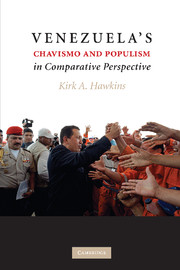Book contents
- Frontmatter
- Contents
- List of Tables
- Preface
- Acknowledgments
- 1 Introduction
- 2 Chavismo, Populism, and Democracy
- 3 Measuring the Populist Discourse of Chavismo
- 4 Party System Breakdown and the Rise of Chavismo
- 5 The Causes of Populism in Comparative Perspective
- 6 Populist Organization: The Bolivarian Circles in Venezuela
- 7 Populist Policy: The Missions of the Chávez Government
- 8 Conclusion
- Appendix A The Populist Speech Rubric
- Appendix B Test of the Sampling Technique
- Appendix C Test of Interaction Effects
- References
- Index
8 - Conclusion
Published online by Cambridge University Press: 17 May 2010
- Frontmatter
- Contents
- List of Tables
- Preface
- Acknowledgments
- 1 Introduction
- 2 Chavismo, Populism, and Democracy
- 3 Measuring the Populist Discourse of Chavismo
- 4 Party System Breakdown and the Rise of Chavismo
- 5 The Causes of Populism in Comparative Perspective
- 6 Populist Organization: The Bolivarian Circles in Venezuela
- 7 Populist Policy: The Missions of the Chávez Government
- 8 Conclusion
- Appendix A The Populist Speech Rubric
- Appendix B Test of the Sampling Technique
- Appendix C Test of Interaction Effects
- References
- Index
Summary
This book began with a series of three interrelated questions about Chavismo: How can we categorize the movement? What are its causes? And what are its unique consequences for Venezuelan politics? The answers all rely on the concept of populism as discourse or worldview. Chavismo is a populist movement, and it has been since Chávez first came to prominence after the failed 1992 coup. The peculiar Manichaean outlook of Chavismo has been relatively constant since at least 1994 and easily predates (and partially explains) the movement's turn to the left in recent years. Understanding the discourse of Chavismo gives us crucial clues to its origins, helping us find these not so much in the decades of economic stagnation that preceded the election of Chávez in 1998 as in the systematic violation of the rule of law that worsened during the oil boom of the 1970s under the protective shelter of Punto Fijo democracy. The unique imprint of the movement's worldview is seen in peculiar organizational features, such as the fact that Chavismo is organized as a polarizing movement. And it is manifested in significant economic policies such as the Missions, which embody the government's leftist brand of populism and include a series of partisan features that contradict a purely office-maximizing strategy.
Seeing populism in terms of ideas does more than help us understand Chavismo, however. It forces us to reconsider our understanding of populism and ultimately helps us spell out the logic that undergirds other successful populist movements.
- Type
- Chapter
- Information
- Venezuela's Chavismo and Populism in Comparative Perspective , pp. 231 - 250Publisher: Cambridge University PressPrint publication year: 2010

